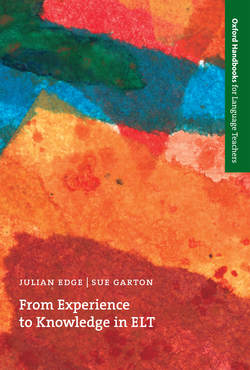From Experience to Knowledge in ELT

Реклама. ООО «ЛитРес», ИНН: 7719571260.
Оглавление
Julian Edge. From Experience to Knowledge in ELT
ACKNOWLEDGEMENTS
INTRODUCTION
PART ONE. Familiarization
1. PEOPLE
Learners
Age
Education
Culture
Learning styles
Teachers
Teacher characteristics
Teacher roles
Summary
Questions and activities
2. LEARNING AND TEACHING PROCESSES
Language learning
The learners’ task
Motivation
Language teaching
Two broad approaches
Five basic elements
Summary
Questions and activities
3. THE ENGLISH LANGUAGE
English and ‘Englishes’
Ownership
Attitude
Ability
Aspects of English
Lexis
Grammar
Functions
Discourse
Pronunciation
Summary
Questions and activities
4. MATERIALS
Published materials
Choosing a coursebook
The teacher’s book
Teacher-produced materials
Authentic materials
Student materials
Student-produced materials
Students as materials
The Internet as a source of materials
Summary
Questions and activities
5. ENVIRONMENT AND EQUIPMENT
The classroom
Furniture
The board
Technology
The overhead projector/computer presentations
Audio equipment
Video equipment
The interactive whiteboard
Computer laboratories
Virtual learning environments (VLEs)
Summary
Questions and activities
PART TWO. Action
6. CLASSROOM MANAGEMENT
Planning
Lesson plans
Interactions
Teacher to student(s)
Student(s) to student(s)
First language and second language
Summary
Questions and activities
7. FROM COMMUNICATION TO LANGUAGE
Tasks
Different types of task
Task-based learning
Other communicative activities
Projects
Role-plays and simulations
Games
Other communication-based methods
Summary
Questions and activities
8. FROM LANGUAGE TO COMMUNICATION
Introducing meaningful models of language
Elicitation
Presentation
Explanation
Conducting careful practice of the language
Organizing communicative interaction
Ways of teaching from language to communication
Correcting errors in language use
Summary
Questions and activities
9. IMPROVING LANGUAGE SKILLS
Receptive skills
Sources of authentic material
Motivation
Skills and strategies
Teaching reading skills
Teaching listening skills
Productive skills
Authentic sources and motivation
Skills and strategies
Integrated skills
Conversations and discussions
Summary
Questions and activities
10. TESTING
Types of test and how to use them
Purposes
Principles
Procedures
Cloze tests
Peer and self-assessment
Portfolios
Teaching and testing
Adapting to powers beyond your control
Coming to terms with failure
Summary
Questions and activities
11. PROFESSIONAL DEVELOPMENT
Reading
Cooperation
Exploration
Qualifications
The Certificate
The Diploma
Teacher Knowledge Test (TKT)
Masters
Summary
Questions and activities
KEY TO QUESTIONS AND ACTIVITIES
GLOSSARY
SOURCES AND FURTHER READING
USEFUL ADDRESSES AND WEBSITES
Отрывок из книги
Photos reproduced with kind permission from: Agence France Presse 145 (traffic/Dominic Burke); Alamy 46 (mobile phone/D. Hurst); Corbis 144 (bristlecone pine/D.S. Robins), Cyclepods Ltd 118 (cycle stand); Getty Images 145 (old women/Z. Kulunzny), 151 (man with laptop/Bilderlounge), 58 (man at reception); Getty Images/Foodpix 95 (cooked prawns/Burke/Triolo Productions); Oxford University Press 145 (the OED image is reprinted by permission of the Secretary to the Delegates of Oxford University Press); Powerstock Superstock 144 (disaster); Roberstock.com 145 (plane/L. Smith); Jodi Waxman/OUP 95 (student visitor greeted), 95 (student visitor in bedroom).
Illustrations in extracts by: Stephan Conlin 58 (town plan); Phil Disley 148 (distracted driver), 110 (‘Welcome to Folkestone’); Martha Gavin 120 (noisy party neighbours); Harry Venning 94 (‘I look just like my father’). All other illustrations by Chris Pavely.
.....
The book is not tied down to any specific course or exam, but there is advice on classroom observation and on how to write about teaching, as well as explicit HIGHLIGHTING in the index of key concepts, as tested by the Cambridge ESOL Teacher Knowledge Test.
The expression, English Language Teaching, and its abbreviation, ELT, is used throughout the book to cover what is also referred to as Teaching English as a Foreign Language (TEFL), Teaching English as a Second Language (TESL), and Teaching English to Speakers of Other Languages (TESOL).
.....